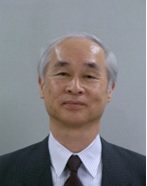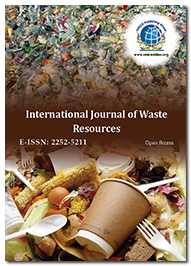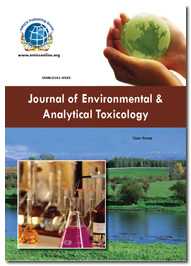Theme: Reduce, Reuse and Recycle for a better tomorrow
Recycling Expo-2015
OMICS International is pleased to announce its annual conferences in 2015 and 2016. One of the premier annual conference is Recycling Meeting.
The conference throws light on thought provoking topics and recent developments in the field of Recycling cancer like, Recycling Basics, Waste Management processes, Municipal waste Recycling, Recycling Cost Benefit Analysis, E-waste Recycling and Management, Waste water recycling, Metal waste & Plastic recycling, Industrial waste recycling, Environmental Impact of Recycling, Recycle Coding System, and many more. Open Minded International Conferences (OMICS) are determined to put forth a platform for eminent personalities to share their expertise and research at Recycling, Barcelona, Spain.
OMICS International proudly invites contributors across the globe to its premier World Congress and Expo on Recycling (Recycling Expo-2015) going to be held during July 20-22,2015 Barcelona, Spain. The aim of Recycling Expo-2015 is to bringing together the researchers, educators, program developers, Industry leads, business leaders and Investors in the international platform and to offer an exciting opportunity to showcase their new research, technology, products and to explore the research in a collaborative way.
OMICS Internationalis committed in serving the scientific community through its Open Access Publication model and by organizing the international scientific events with the aim to make available the healthcare and scientific information in public domain. OMICS Group International Conferences organizes more than 300 international conferences across the globe each year. OMICS Group International conferences are integrated with International workshops, symposia, trade shows in all the areas of Science, Medicine, Engineering and Technology. OMICS Publishing Group publishes around 400 peer-reviewed scholarly Open access journals with the support of 30,000 editorial board members and patronage from more than 3 million readers and more than 1000 associations. OMICS Group Scientific events are stuffed with well organized scientific programs followed by Keynote forums, Plenary lectures, poster presentations, Young researcher forums and world class exhibitions.
This recycling events is basing on the theme: Reduce, Reuse and Recycle for a better tomorrow. The conference mainly focuses on the importance of recycling, recycling basics and various techniques involved in recycling of metals, glass recycling, e-wastage recycling, industrial recycling, plastics, paper,water,methods of composting, clinical recycling, solid waste recycling and home wastage recycling etc. Recycling prevents the environment pollution, saves the energy, conserves natural resources such as timber, water, and minerals, helps to sustain the environment for future generations. European countries are encouraging the recycling centers and recycling services to prevent environment pollution. Spain government is trying to encourage more people to recycle their waste and reduce the Spain’s waste mountain.
Chemical Waste Recycling:
Chemical waste is a waste that is made from harmful chemicals is mostly produced by large factories and industries. Chemical waste includes solids, liquids or gases containing or contaminated with flammable solvents, leachate toxic materials, corrosives, reactive such as oxidizers, cyanides, sulphides, explosives, unstable materials and water-reactive materials, toxic materials including mutagenic, carcinogenic, acute or chronic toxicity materials and polychlorinated biphenyls. Many industrial hazardous wastes can be recycled safely and effectively. A hazardous waste is recycled if it is used, reused, or reclaimed.
Hazardous waste management services market is an important economic factor in Germany with more than 1,000,000 employees employed in the sector generating revenues of over $2 billion in 2007. The total volume of hazardous waste treated in Germany amounted to about 11 million tonnes in 2007. "Well developed policies, legislation and infrastructure have made Germany one of the dominant participants in the European hazardous waste market," states the analyst. "Strong infrastructure has further made Germany a key destination for hazardous waste in Europe". Increased waste generation, stringent laws and inadequate treatment facilities in other European countries, particularly the developing eastern European countries, have resulted in the export of waste to Germany. This trend is expected to continue because of the strong industrial growth witnessed in some eastern European countries and some major market participants are looking at those countries as growth markets for the future.The societies that are working on chemical recycling are
Recycling Council Of Alberta,
Arkansas Recycling Coalition
Arizona Organics Products Committee
Southwest Public Recycling Assn
California Organics Recycling Council etc.
Computer Recycling:
Computer recycling, electronic recycling or e-waste recycling is the recycling of computers and any other electronic devices. Recycling is the complete deconstruction of electronic devices in order to cut down on mining the raw materials and rather extract the materials from old and obsolete electronics.Discarded computer equipment comprises monitors, printers, hard drives and circuit boards. Such items should on no account be thrown out with your household rubbish because they contain toxic substances, and are effectively hazardous waste. E-waste often ends up in the developing world, and the UN’s Environment Program is alarmed by the amount of electronic goods which is improperly disposed of overseas. There is increasing concern about the pollution caused by hazardous chemicals and heavy metals in Africa, Asia and South America.The research report provides a thorough analysis of the global electronics recycling market based on types of equipment, source of equipment and geographies for the period 2013 to 2019. A detailed market analysis and forecast for these segments has been provided in this study, in terms of market revenue (USD billion) for the period 2011 to 2019. The market revenue has been forecast for the period 2013 to 2019, considering 2012 as the base year. Additionally, the report provides a complete outlook of major drivers, restraints and opportunities behind the popularity and growth of electronics recycling.
The major companies that are working on computer recycling are:
3R Network Inc., USA
AVR Recycling, USA.
DS Smith Recycling, UK
Eldon Recycling, Spain
Electronic Recycling:
Electronic products are made from valuable resources and materials include glass, metals and plastics all of which requires energy to manufacture. Recycling consumer electronics conserves our natural resources and avoids air and water pollution and keeps the environment clean as well as greenhouse gas emissions that are caused by manufacturing of virgin materials and If we take an example,
1.Recycling of one million laptops saves the energy equivalent to the electricity used by more than 3,500 United States homes in a year.
2. For every one million of mobiles recycling, 35 thousand pounds of copper and 772 pounds of silver and 75 pounds of gold and 33 pounds of palladium can be recovered.Companies in the Electronic Goods Recycling industry recycle computers, monitors, TVs and other electronics that contain hazardous materials that pose environmental threats when placed in landfills. According to the US Environmental Protection Agency (EPA), the average US household uses about 24 electronic products, a number that is expected to grow over time. With this ever-increasing supply of new electronics, consumers in the US discard more than 2.0 million tons of electronic goods each year. The breakdown below is segmented in terms of the volume of recycled goods by type according to the EPA.
Food Recycling:
Food waste or food loss is food that is discarded or lost uneaten. The causes of food waste or loss are numerous, and occur at the stages of production, processing, retailing and consumption. Composting is a way of nature to recycle all the biodegradable materials. It takes place every day of our lives but to shorten the process, we must contribute our efforts to make sure it produces ideal results. The whole society can benefit from that. Composting food wastes is more extensive than composting other organic matters. We must mix the appropriate ingredient to produce healthy soil good for planting. The important advantage of food waste compost is we can plant food using it, unlike other materials that have numbers of pathogens living in it that can cause harm to food crops and to humans eating those. We can recycle the food waste by urban composting. This method is a two stage process. The first stage rapidly breaks down your food waste without any foul odors using a simple fermentation process. In the second stage your compost is allowed to age and mature, further decomposing into rich hummus for your garden. Meat and dairy can be recycled by using this method.Diversion of food waste from disposal is becoming a priority for local authorities in the UK. As at May 2011 47% of local authorities in the UK are providing a food waste collection service to householders and an increasing number are looking to collect food waste from small businesses and schools.WRAP has information on collecting household food waste and a lot of that information draws on the experience gained from WRAP supported food waste collection trials over the period January 2007 to March 2009.
There are key studies commissioned by WRAP on the nature and scale of food waste together with ways of dealing with food waste. Studies on managing food and garden waste go into the cost benefit analysis for dealing with food and garden waste and on the performance of mixed food and garden waste collections.
Glass Recycling:
Glass recycling is the process of turning waste glass into usable products. Glass waste should be separated by chemical composition, and then, depending on the end use and local processing capabilities, might also have to be separated into different colors. Many recyclers collect different colors of glass separately since glass retains its color after recycling. The most common types used for consumer containers are colorless glass, green glass, and brown/amber glass. The glass component in municipal waste is usually made up of bottles, broken glassware, light bulbs and other items. Adding to this waste is the fact that many manual methods of creating glass objects have a defect rate of around forty percent. Glass recycling uses less energy than manufacturing glass from sand, lime and soda. The glass component in municipal waste is usually made up of bottles, broken glassware, light bulbs and other items. Adding to this waste is the fact that many manual methods of creating glass objects have a defect rate of around forty percent. Glass recycling uses less energy than manufacturing glass from sand, lime and soda. Some recycled glass containers are not able to be used in the manufacture of new glass bottles and jars or to make fiberglass. The recycling approach that the industry favors is any recycling program that results in contaminant-free recycled glass. This helps ensure that these materials are recycled into new glass containers.
An estimated 257,000 tonnes of glass waste is generated each year in Victoria and while 195,000 tonnes or 76 per cent is recovered, only 124,000 tonnes or 48 per cent is recycled back into glass cullet for glass manufacturing. The remaining 52 per cent is made up of glass fines and stockpiles. The stockpiles of recovered glass in Victoria are estimated at over 300,000 tonnes and are largely contaminated with ceramic, stoneware, Pyrex and plastic. Each year, up to 62,000 tonnes of glass is estimated to be lost to landfill the table below provides further description of the volume and type of glass lost across the recovery process.
The following companies are working on Glass recycling
Austin AI, Inc., USA
Nulife Glass Recycling Group Limited, UK
Lubo Systems, screening & recycling, Netherlands
Dexter Field Services, USA
Accent Wire ,USA
Green waste is biodegradable waste that is composed of garden or park waste, such as grass or flower cuttings and hedge trimmings, from residential and commercial sources. Green waste can be decomposed and recycled into organic matter that can be used for various applications. Some means of processing green waste are by composting, anaerobic digestion or gasification. Sometimes, green waste is mixed with other municipal solid waste and needs to be separated from the waste stream in order to be processed; CP Group separating equipment is the solution.
The rising demand for cellulose, cotton, fiberglass, and mineral wool for insulations is projected to show a healthy growth in near future. Rising demand for eco-friendly materials from manufacturers of green roofs is estimated to drive the growth for roofing application in the future. Increasing demand for volatile organic compounds (VOCs) free paints and glues and carpet tiles with recycled content is expected to drive the market for interior finishing. Farming applications market is estimated to grow due to rising demand for new non-conventional materials such as steel with recycled content, engineered lumber, autoclaved aerated concrete, and structural insulated panels during the forecast period.
Recycled paper is paper that is reconstituted into paper again. The best paper to be using is 100% post-consumer recycled paper that is made from paper scrap that can, no longer be used for its intended purpose by the consumer, which is reprocessed into paper again.
The collection of used paper and board is the first step in the recycling process. There are different national and regional collection systems for paper. Papermakers usually buy their raw material for recycling from recovered paper merchants. These merchants may be owned by paper mills and be an integrated part of a mill company, or they may be an independent firm which specializes in particular grades or which perhaps operates in a smaller geographical area.
Industry Analysis & Industry Trends:
Environmental concerns, high commodity prices and increased regulation are making recycling increasingly attractive and viable. While the recession reduced consumer demand for products in general, demand for products manufactured with recycled goods has risen over the past five years. As a result, the Recycling Facilities industry has experienced sustained growth. Furthermore, in the next five years, environmental awareness will continue to spread throughout the US population; demand will continue rising, as new regulations require manufacturers to use more recycled goods
Lists of Societies related to environment: :
• Indian environmental society , delhi ,india
• Global environmental society, Switzerland
• Society of environment, UK
• Society of environmental toxicology and chemistry, North america
• Prakriti environment society, india
Major recycling and related Companies: :
1. Quest Resource Management Group, USA
2. Allied, USA
3. Effective Environmental ,USA
4. Sage Environmental Consulting, USA
5. Dexter Field Services, USA
6. Accent Wire ,USA
7. CompuCycle ,USA
8. Securis, Virginia
9. Marstel-Day, Virginia
10. Atlantic Duct Cleaning, Virginia
Recycling Business Opportunities:
Just about any product on the market today can be made out of recycled materials. Instead of using virgin materials that have been mined or harvested from natural areas, recycled products are made from materials that have already been used once, and have been collected and processed to be used again as feedstock’s in new products. Similarly, many products can be repaired or otherwise reused, before their parts are recycled into different products. Because of the environmental, social, and economic benefits associated with reuse and recycling, many sustainable business opportunities and broad public support exist for small-scale manufacturers of recycled products. While reuse and recycling reduce the need for landfills and incinerators, which can produce significant environmental problems, the greatest environmental benefits of reuse and recycling come from the natural resource and energy savings they provide.
Using recycled materials decreases the need for virgin resources, which are often extracted from environmentally-sensitive areas. Manufacturing with recycled materials typically requires much less energy than using virgin resources, because the materials have already been processed at least once. For example, manufacturing glass containers with recycled cullet consumes 32% less energy than using virgin materials. Small-scale, locally-based manufacturers also provide economic and social benefits to their communities. Recycling-based manufacturing can involve complex and expensive technology, but it can also be low-tech and labor intensive, providing a variety of training and employment opportunities to communities. In one recent study conducted in the State of Washington, recycling-based manufacturing employed more people than the biotechnology industry.
Similar studies have shown recycling-based manufacturers provide a wide range of skilled and unskilled jobs at living wages. In California, several state and local incentives exist to assist manufacturers using recycled materials. AB 939 requires 50% diversion of solid waste from landfills by the year 2000 and AB 2020, known as the Beverage Container Recycling program, provides a network of recycling locations to encourage consumers to redeem empty beverage containers for the CA refund value (CRV) to encourage recycling. California also has several laws which require recycled content in products and mandate that state agencies buy recycled products. The California Department of Conservation, which administers AB 2020, and the California Integrated Waste Management Board (CIWMB), which administers AB 939, both have programs that assist manufacturers who use recycled materials (see Chapter Six for more information). Many local governments, especially those within the CIWMB’s Recycling Market Development Zones, also provide incentives to recycling-based manufacturers.

Dear Colleagues,
On behalf of the Organizing Committee of the World Congress and Expo on Recycling which is going to be held during July 20-22, 2015 at Barcelona, Spain, It is my honor to welcome the delegates of nations and institutions to this worldwide event.
Economic and environmental reasons are the base for the ever increasing needs of recycling in our society. Industries and governments are joining their efforts and learning to work together towards better, faster and more efficient ways to recycle for a better future.
As peoplecommitted to increase the sustainability of our world by recycling resources, the delegates, will share our accomplishments towards“Reduce, Reuse and Recycle for a better tomorrow” with the aim of nothing but reaching a better tomorrow in a sustainable planet.
Furthermore, the venue of this event, Barcelona, is one of the most committed cities for recycling of Spain and its outstanding beauty will sure be an added bonus, to help us remember this event.
With Best Regards,
M. A. Martin-Luengo
Professor
Institute of Materials Science of Madrid, CSIC
Spain
Importance & Scope:
Recycling is a process to change waste materials into new products to prevent waste of potentially useful materials, reduce the consumption of fresh raw materials, reduce energy usage, reduce air pollution (from incineration) and water pollution (from landfilling) by reducing the need for "conventional" waste. Recycling conference provides an opportunity for all business scholars working in this field to showcase their achievements. It is expected to attract renowned speakers, principal investigators, experts and researchers from both academia and recycling industry to join together and discuss their views and research.
For more details visit: http://recycling.omicsgroup.com/
Glance at Recycling:
As per a report of Bureau of International Recycling 40% of the global raw material needs are covered by recycled materials. The cost of global waste market is a worth of $410 billion. As reported by Veolia Poland uses its 90% of municipal waste in landfill sites, whereas Netherlands disposes only 1.7% % through land filling. Japan recycles 74% of municipal wastes and South Korea is able to recycle only 49% of its municipal waste and waste management. Many factors also associated with the choice of disposal, recycle or recovery route that includes; legal constraints of different countries, ecological awareness, degree of economic development and climatic factors etc. Major recycling sectors include recycling of waste water, recycling of metals, plastics, industrial waste, e waste, municipal waste etc. As per a report global market of waste water recycling increased from $6.7 billion to $9.5 billion during 2009 to 2012 and is expected to $23.4 billion by 2017 with a CAGR of 19.7%. As reported by Bureau of International Recycling 1.6 million people are associated with recycling industry and they used to handle more than 600 million tons of recyclables every year with an annual turnover of more than $200 billion. European countries are now encouraging Renewable energy from natural sources to minimize the environmental pollution. Countries like Portugal, Colombia and Malaysia are the leading countries in which 10% of their amount is spent on R&D, new technologies in recycling, generating high skilled job sectors and has become a key driver for tomorrow’s sustainable development. The recycling industry has become an integral part of modern society not only due to its social and economic impact but due to its vital role for the future of our planet. The European Research Council (ERC) that funds junior and senior world-class researchers based in Europe is keen on promoting fundamental research in all areas and conducting waste expos and recycling and its allied areas. Around 150 projects are currently being funded by the ERC in this field. USEPA is also encouraging the Recycling researches in their societies.
World Congress and Expo on Recycling will commence from July 20-22, 2015 in Barcelona, Spain, with the theme, “Reduce, Reuse, and Recycle for a better tomorrow”. Target Audience for Recycling Expo-2015 will be personnel from both industrial and academic fields which include; Directors/Managers, Head of Departmental, Presidents/Vice Presidents, CEO, Research Scholars and students from the related fields. World-renowned speakers with their ultimate talks on the most recent techniques, tactics, and the avant garde technologies in Recycling are the hallmarks of this conference.
Conference Highlights
- Recycling Basics
- Waste Management processes
- Municipal waste Recycling
- Recycling Cost Benfit Analysis
- E-waste Recycling and Management
- Waste water recycling
- Metal waste and Plastic recycling
- Industrial waste recycling
- Environmental Impact of Recycling
- Agriculture waste recycling
- Food waste Recycling
- Recycle Coding System
- Recycling of Glass, Paper, Wood, Textile and Building materials
To share your views and research, please click here to register for the Conference.
To Collaborate Scientific Professionals around the World
| Conference Date | July 20-22, 2015 | ||
| Sponsors & Exhibitors |
|
||
| Speaker Opportunity Closed | Day 1 | Day 2 | Day 3 |
| Poster Opportunity Closed | Click Here to View | ||
Useful Links
Special Issues
All accepted abstracts will be published in respective Our International Journals.
- International Journal of Waste Resources
- Expert Opinion on Environmental Biology
- Journal of Environmental & Analytical Toxicology
Abstracts will be provided with Digital Object Identifier by































